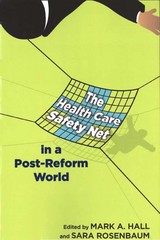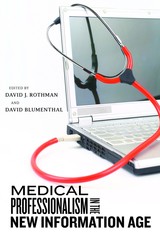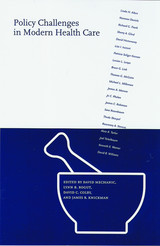
The Health Care Safety Net in a Post-Reform World examines how national health care reform will impact safety net programs that serve low-income and uninsured patients. The “safety net” refers to the collection of hospitals, clinics, and doctors who treat disadvantaged people, including those without insurance, regardless of their ability to pay. Despite comprehensive national health care reform, over twenty million people will remain uninsured. And many of those who obtain insurance from reform will continue to face shortages of providers in their communities willing or able to serve them. As the demand for care grows with expanded insurance, so will the pressure on an overstretched safety net.
This book, with contributions from leading health care scholars, is the first comprehensive assessment of the safety net in over a decade. Rather than view health insurance and the health care safety net as alternatives to each other, it examines their potential to be complementary aspects of a broader effort to achieve equity and quality in health care access. It also considers whether the safety net can be improved and strengthened to a level that can provide truly universal access, both through expanded insurance and the creation of a well-integrated and reasonably supported network of direct health care access for the uninsured.
Seeing safety net institutions as key components of post-health care reform in the United States—as opposed to stop-gap measures or as part of the problem—is a bold idea. And as presented in this volume, it is an idea whose time has come.


Health care delivery in the United States is an enormously complex enterprise, and its $1.6 trillion annual expenditures involve a host of competing interests. While arguably the nation offers among the most technologically advanced medical care in the world, the American system consistently under performs relative to its resources. Gaps in financing and service delivery pose major barriers to improving health, reducing disparities, achieving universal insurance coverage, enhancing quality, controlling costs, and meeting the needs of patients and families.
Bringing together twenty-five of the nation’s leading experts in health care policy and public health, this book provides a much-needed perspective on how our health care system evolved, why we face the challenges that we do, and why reform is so difficult to achieve. The essays tackle tough issues including: socioeconomic disadvantage, tobacco, obesity, gun violence, insurance gaps, the rationing of services, the power of special interests, medical errors, and the nursing shortage.
Linking the nation’s health problems to larger political, cultural, and philosophical contexts, Policy Challenges in Modern Health Care offers a compelling look at where we stand and where we need to be headed.
READERS
Browse our collection.
PUBLISHERS
See BiblioVault's publisher services.
STUDENT SERVICES
Files for college accessibility offices.
UChicago Accessibility Resources
home | accessibility | search | about | contact us
BiblioVault ® 2001 - 2024
The University of Chicago Press









